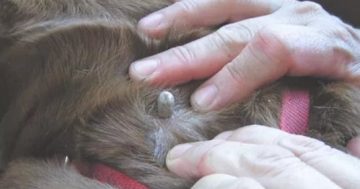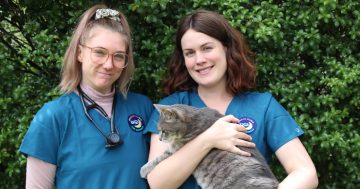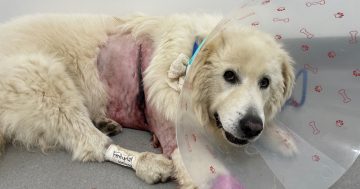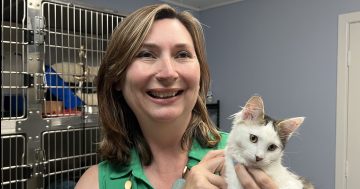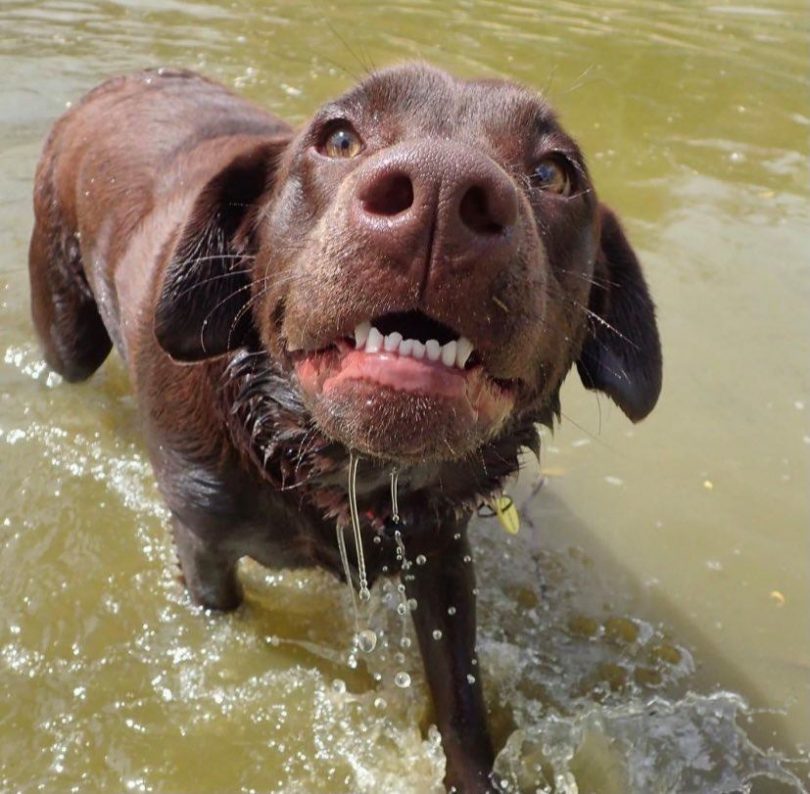
Monty needs frequent veterinary care, but that’s getting harder to find in Canberra. Photo: Supplied.
Meet Monty, a 10-year-old chocolate Labrador with arthritis that requires injections every six months.
Monty and his owner, Sian Braun, have been to the vet at least seven times since the start of the global pandemic. He is one of three pets in Ms Braun’s family, and she says she feels lucky they have not experienced the vet shortage in Canberra like other unfortunate pet owners have.
“The vet we see is the sole vet at the clinic and he appears to be overworked and tired. However, he’s always happy and playful with Monty, which is a bonus,” Ms Braun said.
But with a decline of practitioner numbers in the vet industry, more pet owners may soon face the consequences of a nationwide shortage.
The same can be said for many vets in Canberra who are overworked. Some clinics have had to close temporarily due to exhausted staff.
These closures, although important for staff, can be worrying for owners and dangerous for animals with conditions that need frequent visits or emergency appointments, like Monty.
The crisis in vet numbers was exacerbated by the pandemic. Many factors can be attributed to the shortage, including entry requirements to necessary education, degree cost, and young vet health and wellbeing.
Compounding that, the average career length of a vet varies between 16 and 24 years.
In 2017, the ACT had just 381 vets, roughly one in 1200 people.
Animal Referral Hospital managing director Jacob Michelsen says his clinic is among those to feel the impacts of the crisis. His clinic has had long hours, limited staff numbers and high workloads.
Since the start of the pandemic, there has been an increase in pet adoptions, especially in Canberra.
Dr Michelson estimates a “10 to 15 per cent increase in pet numbers”. This adoption increase with the pre-existing factors has impacted the industry, especially the ARH, who have seen a “30 per cent increase in workloads”.
The clinic was temporarily shut earlier this year, only taking very extreme cases because of their limited staff numbers.
“We didn’t like not being able to help people and their pets out of hours, but we just couldn’t do everything we had to do with one vet alone on a shift,” Dr Michelson said.
The clinic has also seen staff numbers drop since the start of the pandemic, with some workers finding “less stressful GP jobs with more normal working hours”.
Canberra has seen many other clinics temporarily close to help manage workloads and give their exhausted staff time off.
“Closing for a few weeks helped manage the caseload but even when we were closed, we still had to staff the Emergency Department due to the large number of hospitalized patients requiring overnight care,” Dr Michelson said.
Education pathways appear to be a big factor in Canberra’s crisis in particular, as access to education is limited.
“It is a national problem and just happens to be worse in Canberra,” Dr Michelson said.
He believes a change in education access in the ACT could help.
“The lack of a local vet school also makes it difficult,” he said. “Perhaps if ANU or UC decided to start a vet school, this could change.”
Many Canberrans who are interested in becoming a vet must travel to other major cities and regional centres for their degree, which sometimes entices them to leave for good.
Dr Cristy Secombe, Head of Veterinary and Public Affairs for the Australian Vet Association, also points out an increase in abuse towards veterinary staff. Dr Secombe urges Australians to have “empathy and understanding” as “COVID has made things challenging for everyone”.
Dr Michelson agrees.
“No service industry copes well with a 30 per cent workload increase in a two-week period. Clearly, the human medical system is struggling too.”
Although the shortage has not affected animals like Monty, that isn’t to say that owners like Ms Braun aren’t still worried.
“I think the overall shortage is a concern for all pet owners who want the best level of care for their pets,” she said.
“I would implore people to remember that veterinary staff are humans and experiencing the same stresses as the rest of us due to the pandemic. They are providing so many of us essential care and services for our animals and deserve to be treated with respect and empathy.”
Emilie Kramaric is a final year journalism student at the University of Canberra and a participant in the digital news project with Region Media.













